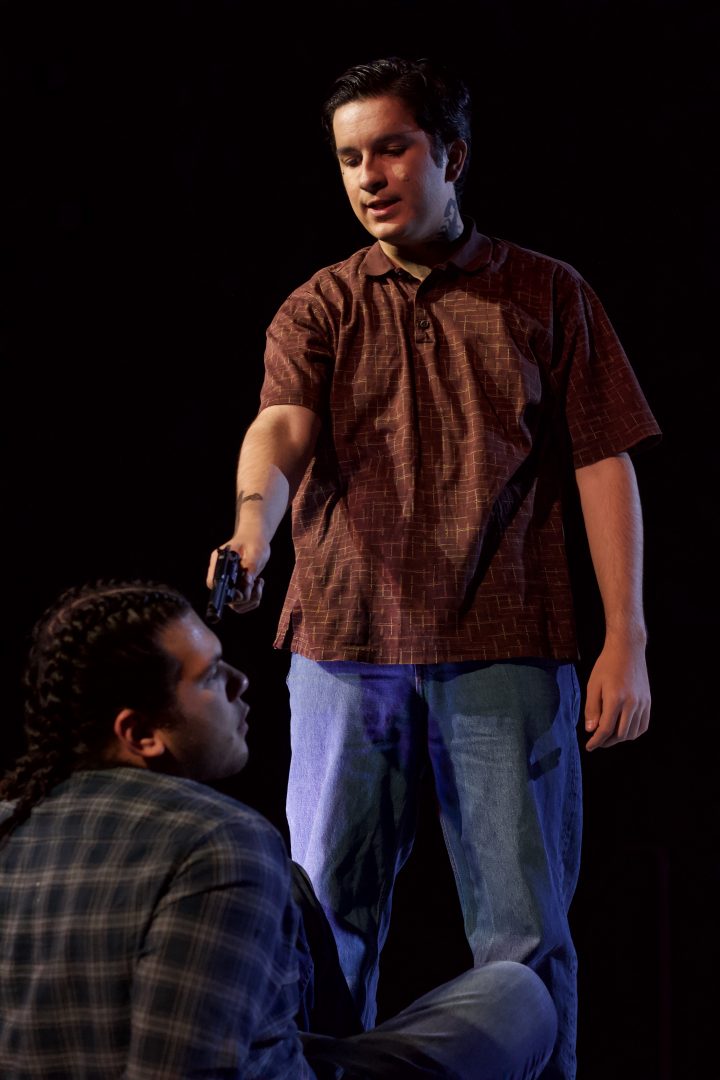“Oedipus El Rey” premiered on Nov. 18 at the Selma Arts Center, putting a riveting Chicano spin on Sophocles’ classic story.
Written by Luis Alfaro and directed by Fresno State alumnus Rodolfo Robles Cruz, the play follows Oedipus, a Chicano victim of the prison-industrial complex who attempts to reintegrate into society and whose predetermined fate has him kill his own father and marry his mother.
Born to Jocasta and Laius, a top-ranking gangster who controls territory in Los Angeles, Oedipus is raised by Tiresias, Laius’ right-hand man. After being told of a prophecy that his own son would kill him, Laius instructs Tiresias to kill an infant Oedipus. Tiresias takes pity on Oedipus, sparing him from death, but is unable to prevent him from falling into a life of crime.
After Oedipus is sent to prison, Tiresias commits crimes to purposefully get himself into prison to raise Oedipus, attempting to show him the importance of faith and religion. By the time he leaves prison, however, Oedipus believes in only one thing: himself.
The play stays faithful to the key plot points of the original story. However, its use of Chicano and cholo culture make the play much more engaging.
Oedipus, performed by Mason T. Beltran, is easy to relate to throughout his journey to attempt to become something greater. Beltran’s portrayal of Oedipus’ struggle excellently captures the idea of a Chicano trying their best to avoid society’s harsh expectations of them. Oedipus tries to follow the advice of Tiresias and avoid the gangs in L.A., but after being rejected from jobs because of his previous convictions and ethnicity, he is left with no choice but to go to LA.
Beltran exudes frustration and determination, portraying a genuine personification of Oedipus’ struggles. Agustin Chapa’s performance as the wise Tiresias is just as compelling, with his delivery and body language adding to the character’s enlightened aura.
Moreover, Ellie West’s and Juan Luis Guzmán’s performances as Jocasta and Laius respectively also add another layer of depth to the production. Guzmán’s portrayal of Laius wonderfully captures the prideful nature of the character, who believes he will be king forever. Westis able to distinctively convey Jocasta’s tragedies as a woman, wife and mother. Though she is shown to be vulnerable, she is equally as resilient.
The chorus that follows Oedipus and drives the story forward, played primarily by Thomas Estrada Jr., Jennifer Rodriguez and Carlos O. Sanchez, is perhaps the most versatile aspect of the entire production. They provide the audience with exposition and humorous remarks, while at the same time setting the mood whenever any of the characters move locations. When Oedipus is in the barrio, the choir is sure to be nearby to ridicule and meddle in his affairs.
Sanchez plays Creon, Jocasta’s brother, who is attempting to pick up after the death of Laius, often accompanied by Estrada Jr. and Rodriguez. Though they may not be the focus of the play, the performances by Estrada Jr., Rodriguez and Sanchez are easily the most humorous and multifaceted.
What the play does best, however, is tell a story unlike most other plays that revolve around Chicano culture. Though the story itself is a tragedy that revolves around the prison system, gang culture and the cycle of violence we see a lot in Chicano and cholo culture-inspired media, it doesn’t carry itself with sadness.
Instead, we see a character who is determined not to be a pawn in the grand scheme of things, opposing both cultural and societal expectations and norms. Though Oedipus ends in tragedy, he was proud to do it his way, not allowing anyone, not even God himself, to get in his way to become king.




